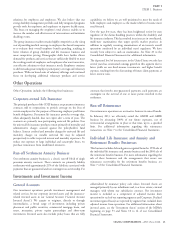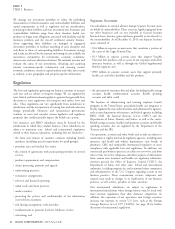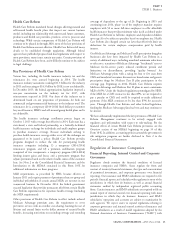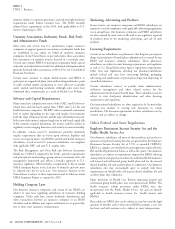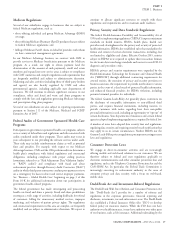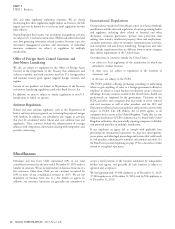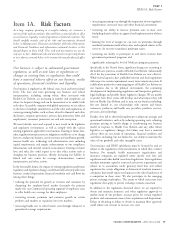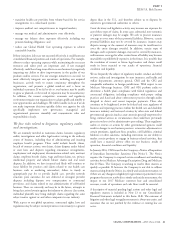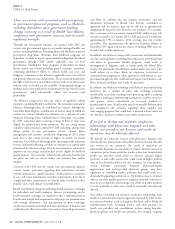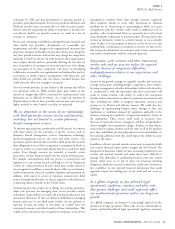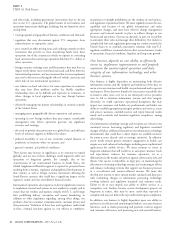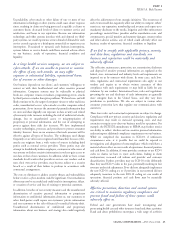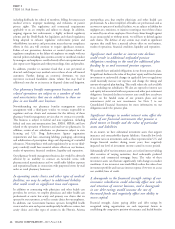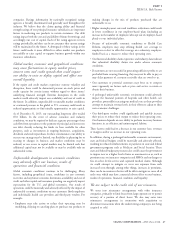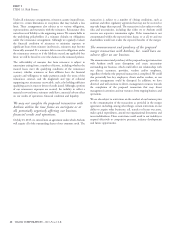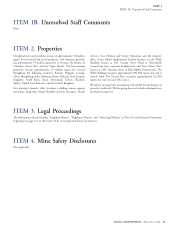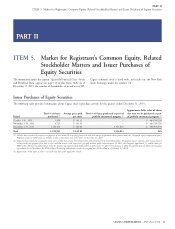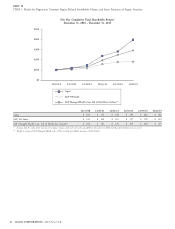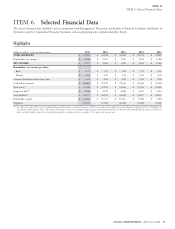Cigna 2015 Annual Report Download - page 53
Download and view the complete annual report
Please find page 53 of the 2015 Cigna annual report below. You can navigate through the pages in the report by either clicking on the pages listed below, or by using the keyword search tool below to find specific information within the annual report.PART I
ITEM 1A. Risk Factors
reductions by CMS and state governments in amounts payable to management’s attention from other strategic activities, negatively
providers, particularly hospitals, for services provided to Medicare and affect employee morale or create other operational or financial
Medicaid enrollees may exacerbate the cost shift to private payors, problems for us. Terminating or transitioning in whole or in part
thereby adversely impacting our ability to maintain or develop new arrangements with key vendors could result in additional costs or
cost-effective health care provider contracts or result in a loss of penalties, risks of operational delays or potential errors and control
revenues or customers. issues during the termination or transition phase. We may not be able
to find an alternative vendor in a timely manner or on acceptable
Recent and continuing consolidation among physicians, hospitals and terms. If there is an interruption in business or loss of access to data
other health care providers, development of accountable care resulting from a termination or transition in services, we may not be
organizations and other changes in the organizational structures that able to meet the demands of our customers and, in turn, our business
physicians, hospitals and health care providers choose may change the and results of operations could be adversely impacted.
way these providers interact with us and may change the competitive
landscape in which we operate. In some instances, these organizations
Acquisitions, joint ventures and other transactions
may compete directly with us, potentially affecting the way that we
involve risks and we may not realize the expected
price our products or causing us to incur increased costs if we change
benefits because of integration difficulties,
our operations to be more competitive. Our focus on developing
collaborative accountable care organizations and independent practice
underperformance relative to our expectations and
associations or similar business arrangements with physicians and
other challenges.
other health care providers may not achieve intended benefits that As part of our growth strategy, we regularly consider and enter into
could adversely affect our strategy or prospects. strategic transactions, including mergers, acquisitions, joint ventures,
Out-of-network providers are not limited in the amount they bill by licensing arrangements and other relationships (collectively referred to
any agreement with us. While benefit plans place limits on the as ‘‘transactions’’), with the expectation that these transactions will
amount of charges that will be considered for reimbursement, such result in various benefits. Our ability to achieve the anticipated
limitations can be difficult to enforce. As a result, the outcome of benefits of these transactions is subject to numerous uncertainties and
disputes where we do not have a provider contract may cause us to pay risks, including our ability to integrate operations, resources and
higher medical or other benefit costs than we projected. systems in an efficient and effective manner. We could also face
challenges in implementing business plans; changes in laws and
We are dependent on the success of our relationships
regulations or conditions imposed by regulations applicable to the
business; retaining key employees; and general competitive factors in
with third parties for various services and functions,
the marketplace. These events could result in increased costs,
including, but not limited to, certain pharmacy
decreases in expected revenues, earnings or cash flow, and goodwill or
benefit management services.
other intangible asset impairment charges. Further, we may finance
To improve operating costs, productivity and efficiencies, we contract transactions by issuing common stock for some or all of the purchase
with third parties for the provision of specific services, such as price that could dilute the ownership interests of our shareholders, or
pharmacy benefit management services, information technology, by incurring additional debt that could impact our ability to access
medical management services, call center and claim services. Our capital in the future.
operations may be adversely affected if these third parties fail to satisfy In addition, effective internal controls are necessary to provide reliable
their obligations to us or if the arrangement is terminated in whole or and accurate financial reports and to mitigate the risk of fraud. The
in part or if there is a contractual dispute between us and these third integration of businesses is likely to cause increasing complexity in our
parties. Even though contracts are intended to provide certain systems and internal controls and make them more difficult to
protections, we have limited control over the actions of third parties. manage. Any difficulties in assimilating businesses into our control
For example, noncompliance with any privacy or security laws and system could cause us to fail to meet our financial reporting
regulations or any security breach involving one of our third-party obligations. Ineffective internal controls also could cause investors to
vendors or a dispute between us and a third party vendor related to lose confidence in our reported financial information that could
our arrangement could have a material adverse effect on our business, negatively impact the trading price of our stock and our access to
results of operations, financial condition, liquidity and reputation. In capital.
addition, with respect to services or functions outsourced to third
parties in foreign jurisdictions, we also are exposed to risks inherent in
As a global company, we face political, legal,
conducting business outside of the United States.
operational, regulatory, economic and other risks
Outsourcing also may require us to change our existing operations,
that present challenges and could negatively affect
adopt new processes for managing these service providers and/or
our multinational operations and/or our long-term
redistribute responsibilities to realize the potential productivity and
growth.
operational efficiencies. If there are delays or difficulties in changing
business processes or our third party vendors do not perform as As a global company, our business is increasingly exposed to risks
expected, we may not realize, or not realize on a timely basis, the inherent in foreign operations. These risks can vary substantially by
anticipated economic and other benefits of these relationships. This market, and include political, legal, operational, regulatory, economic
could result in substantial costs or regulatory compliance issues, divert
CIGNA CORPORATION - 2015 Form 10-K 23


